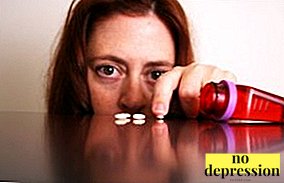In a broad sense, suspiciousness is human obsession on a certain object, the cause of which was a certain traumatic situation. In some cases, this term refers to a specific character trait, but it is difficult to call it safe.
A person may not attach importance to his suspiciousness and the factor that provoked it, but mental disorder will develop, turning into a serious pathology.
To state may join phobias, to get rid of which will be extremely difficult. When asked how to get rid of suspicion, psychologists suggest using a few practical recommendations.
What it is?

Vigilance is a form of addiction.
In a slight degree, the pathological condition gives a slight discomfort, but with progression it can provoke serious mental disorders.
The suspicious person is prone to pessimistic perception of reality, his mind is subject to the emergence of negative thoughts and unfounded fears. Such people are suspicious, possess numerous complexes and are difficult to adapt in society.
Provoke suspiciousness The following factors may:
- excessive sensitivity of the psyche;
- the consequences of traumatic situations;
- low self-esteem and self-doubt;
- neurological abnormalities.
What does the suspicious person mean?
Helpful man is in constant anxiety.
The object of fear can be your own life, the health of loved ones or other factors, but the experiences are always negative.
A man of doubt awaits the inevitable emergence of trouble. Even funny events in his life do not bring joy. Waiting for something bad violates the perception of everyday or pleasant situations.
For the suspicious person characterized by the following features:
 Excessive worries about their own health.
Excessive worries about their own health.- Exaggerating the significance of different situations.
- Unreasonable suspicion of deception by others.
- Hypersensitivity of the psyche and excessive sensitivity.
- Tendency to hypochondria (inventing various diseases).
- Excessive irritability and depression.
What is suspiciousness and who are suspicious people? Find out from the video:
Is it a disease or a character?
Initially suspiciousness is a specific trait of character. In psychology, there is a special type of personality - “anxious and suspicious”. Such people are overly sensitive psyche.
They are more worried because of insults, mistakes and failures. In this case suspiciousness is a trait of character. If this type of personality is regularly exposed to negative factors, the increased sensitivity of the psyche can become a mental disorder.
To determine suspiciousness as a disease or character trait can only specialist by conducting special psychotherapeutic techniques.
Difference from anxiety

Anxiety is an inherent symptom of suspiciousness.
Attacks of fear become uncontrollable and cause considerable discomfort.
The object of the alarm may be health condition, life or certain events.
The man of doubt is in constant anxiety. From the natural feeling of fear and anxiety, this state is distinguished by the degree of severity and cause of occurrence.
Anxiety resulting from obvious factors (for example, fear of skating after a serious injury, fear of dark streets after an attack, etc.) is considered a norm.
Symptoms
Doubtful is what? Excessive suspiciousness can be accompanied not only by certain psycho-emotional states, but also supplemented by health related disorders.
For example, if a person is afraid of infection with dangerous microbes or an incurable disease, then after a certain period of time, there will be real deviations in the work of the organism. In addition, suspicious people are always distinguished by their behavior and attitude to life.
Indicate suspiciousness The following factors may:
 excessive irritability;
excessive irritability;- body fatigue (physical and mental);
- tendency to depression;
- the emergence of obsessive thoughts and ideas;
- inadequate response to situations that do not entail danger;
- strong susceptibility to the information received;
- rigidity of thinking;
- excessive sensitivity of the psyche;
- unreasonable anxiety;
- diffidence.
How to overcome suspiciousness? Tips in this video:
How to deal with it?

The best way to get rid of suspiciousness is appeal to a psychologist but in most cases, patients begin to use the help of specialists when pathology reaches its peak.
If there is a suspicion of excessive anxiety, it is necessary as soon as possible to try to get rid of it yourself.
At the initial stages of development of suspiciousness, some methods have good efficiency.
Problem solving plan:
- recognition of the existence of the problem and awareness of its nature;
- seeking help from a specialist (psychologist or psychotherapist);
- identifying the reasons for the lack of trust in people;
- a change in attitude towards the factor provoking suspiciousness;
- exclusion of linking past events with reality;
- learning to control your emotions;
- development of logical thinking;
- training yourself to be positive;
- communication with positive people.
Is there any medicine?

How and what to treat ailment? Eliminate suspiciousness medication impossible.
Drugs help to normalize the state of the psyche, but with the slightest effect of a provoking factor, there is a risk of symptoms appearing with a new intensity.
The only and most effective way to get rid of this problem is psychotherapy and regular self-esteem exercises, self-confidence and the development of personal qualities.
Features of the use of drugs for treating suspiciousness:
- Initially, suspiciousness is a character trait and a certain type of personality; it is impossible to correct the character with medicines.
- To reduce the symptoms of suspicion, sedatives that are not addictive and have a slight therapeutic effect (Persen, Novopassit and so forth).
- When using sedatives, their uncontrolled reception is necessarily excluded (otherwise, the state of mind may deteriorate).
- Medicines can be used in cases where suspiciousness is a concomitant symptom of a mental disorder (the course of therapy and the types of drugs are determined only by a doctor).
Practical tips to overcome
I am very suspicious: what to do? You can only get rid of suspiciousness full work on your mind and behavior. This process is rather complicated and you should not expect quick results from it.

If you manage to cope with suspiciousness independently, the occurrence of a repeated problem will be practically excluded.
Having learned to eliminate bad thoughts and control his actions, a person gets maximum self-control skill.
Practical advice of psychologists:
- Important recall the factor that provoked psycho-emotional shock and realize his erroneous perception (for example, if a person has offended you, you should convince yourself that he did not do it on purpose).
- Positive look at the problem (in a situation that has become a cause of suspicion, we must try to identify positive or fun moments).
- Work on increase self-esteem (It is important to reveal in oneself as many positive qualities as possible, to recall the maximum number of achievements, even insignificant ones).
- Problem solving as they occur (you should not be afraid of the negative outcome of events in advance, if the solution of any issue is delayed, then you need to abstract yourself from the situation, and look for ways to solve the problem only after it actually occurs).
- Eliminate obsessive thoughts (if you have bad thoughts, you should abstract away from them as quickly as possible, you can distract yourself with the help of hobbies, reading, music or concentrating on any task involving the use of logical thinking).
- Psychologists recommend sensitive people make a diary (it is necessary to write down in it not only experiences and fears, but also the maximum number of events that occurred during the day, you must describe your own attitude to them, thanks to the diary you can independently determine not only objects of suspiciousness, but also reveal its causes).
About how to stop being suspicious about health, in this video:
How to cope with the fear of health?

Mental health concerns can trigger mental illness, which in psychiatric practice is termed "hypochondria".
This condition is accompanied by constant suspicions about the development of deadly diseases, the search for their symptoms and the uncontrolled taking of drugs to get rid of invented pathologies.
The danger of hypochondria is a high risk of the occurrence of real pathologies that will arise against the background of mental disorders and actions aimed at elimination of objects of fear.
How to beat increased fear? If there is excessive suspicion of health, the following actions should be taken:
- Appeal to a psychologist or psychotherapist (specialists will use the methods of cognitive-behavioral therapy, hypnosis, individual and group classes, as well as other psychotherapeutic techniques).
- Should exclude reading medical literature and viewing programsrelated to this topic (suspicious people, after receiving information about diseases, begin to look for symptoms in their bodies and are sure to find them).
- Maximum distraction from the problem and obsessive thoughts (walks in the fresh air, playing sports, hobbies, developing new skills in oneself - drawing, weaving from beads, etc.).
- If symptoms of various diseases occur, consult a doctor and be examined (self-diagnosis and treatment should be excluded).
- Formation of positive thinking (in daily events, you should try to look for as many positive points as possible, you should also make fun of your own fears).

Adjusting your lifestyle will help speed up the process of eliminating suspiciousness.
You must comply with sleep and wakefulness, eliminate physical and mental stress, adhere to the rules of healthy eating and try to prevent stressful situations.
Additionally, you can master the techniques of respiratory gymnastics and meditation.

 Excessive worries about their own health.
Excessive worries about their own health. excessive irritability;
excessive irritability;

